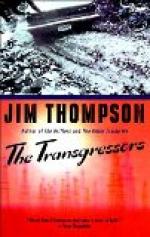Nero thrumming his violin from the vantage point of the crowning hill of Rome, had no such portraiture of the degradation of humanity as that which the Magnates nightly view from their balconies. A stranger would be struck with surprise that the thousands should be huddled in dens that wild animals would find uninhabitable, while the sons of greed and avarice flaunt their trappings of mammon from the hilltops.
This is the arena in which is to be enacted a scene of this great drama. The actors, the audience are gathering.
Mingled sounds of strange nature are on the air. The murmur always present where multitudes are assembled runs as an undertone; the sharp notes of frightened women and terrified children rise as the tones of an oratorio; steady, full, vibrant are the sounds of the men’s voices.
On the countenances of the men can be read the exultation of their hearts, that at least one of their tyrants has encountered his Nemesis. Faces here and there are wreathed in smiles, as though their possessors were hastening to a fete. Some are grave, for the thought of the retribution that the Magnates will demand, and which they knew so well how to secure, is enough to bring a pallor to the cheek. There are men in the eddying thousands who have felt the hot lead of Latimer and Hazleton burn into their backs and the recollection makes them shudder. They are again upon a highway, but is this a protection against the violence of their masters? They are now, as then, unarmed, but is this a safeguard against the rifles of the hirelings?
From the bridge that connects the shores of the river, to the mansion of the Coal King, is a distance of two miles. The broad avenue affords an excellent concourse and down it the throng fairly runs. They traverse the distance in twenty minutes.
An army advancing into an enemy’s country could not preserve better order. Far in advance of the main body of the toilers is the vanguard, a group of twenty of the acknowledged leaders of the men. It is at their suggestion that the cowed wretches have mustered up courage enough to cross the bridge and enter upon the interdicted boulevard. So it is incumbent upon them to show no trepidation.
Immediately behind them are the more adventurous ones, followed by the women and children, who, like angels, tread where men fear to go. The great mass of the crowd is composed of the workmen of the town. The faint-hearted and the cowardly bring up the rear. When the marble steps that lead up to the mansion are reached, the vanguard halts. The impetus of the entire line is arrested as if by magic. An unheard, invisible signal is obeyed, the signal of fear. Then the men in advance beckon to the people to come forward.
A score of young men respond as if to a summons for volunteers, and in their wake press the multitude.
The tumult ceases. The moment for action is approaching and men concentrate their attention on what is being done by the leaders.




